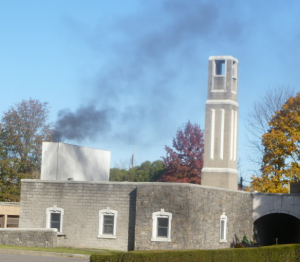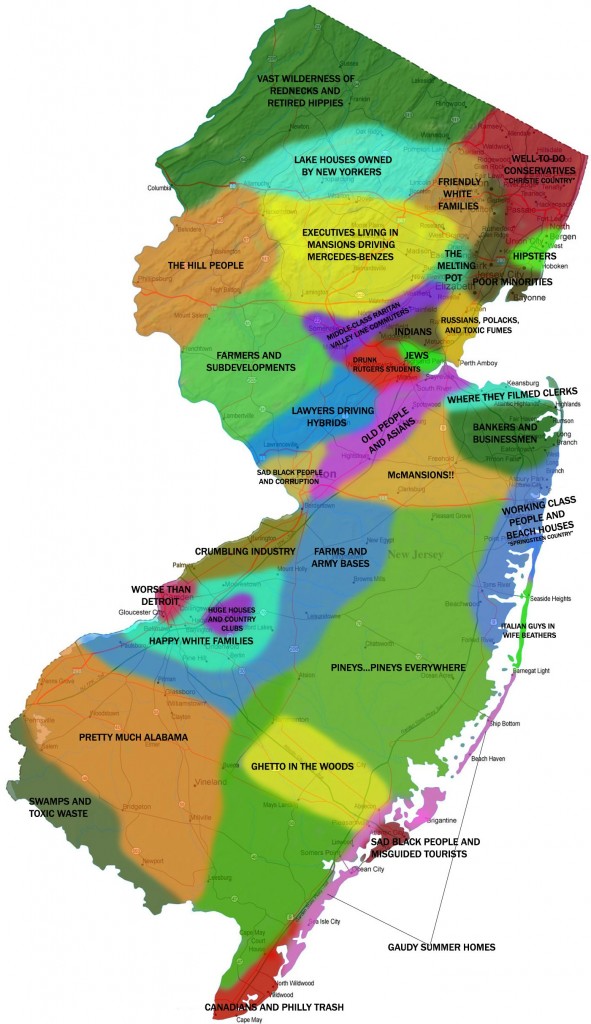Crematorium Has Oceanport Officials Hot
 Oceanport officials are burning over the prospects of the Woodbine Cemetery installing a crematorium with a smoke stack in a residential neighborhood of the borough.
Oceanport officials are burning over the prospects of the Woodbine Cemetery installing a crematorium with a smoke stack in a residential neighborhood of the borough.
In a statement released by Councilman Joe Irace yesterday and posted on the Oceanport website , the borough complains that the only public notification that Woodbine Cemetery was seeking to build a crematorium was in a public notice published in the Home News, an Asbury Park Press affiliated publication that is distributed in Middlesex and Somerset counties.
The borough became aware of the situation via a letter from the Department of Environmental Protection informing them that Woodbine was seeking an Air Pollution Control Permit.
Posted: July 26th, 2014 | Author: Art Gallagher | Filed under: John Bennett, Monmouth County, Oceanport | Tags: Crematorium, DEP, Home News, Joe Irace, John Bennett, New Jersey Cemetery Board, NJ Department of Environmental Protection, Oceanport, Woodbine Cemetery | 1 Comment »Christie Administration Proposes ‘Streamlined’ Coastal Permitting Rules
 Christie Administration Proposes ‘Streamlined’ Coastal Permitting Rules (via Toms River Patch)
Christie Administration Proposes ‘Streamlined’ Coastal Permitting Rules (via Toms River Patch)
Environmentalist questions relaxing some permitting rules The state Department of Environmental Protection on Tuesday said it would recommend technical revisions to land use rules for coastal areas, streamlining the process for projects such as marina…
Sandy elevation program backlog will ease by end of summer, top NJ official says
 Sandy elevation program backlog will ease by end of summer, top NJ official says (via NJ.com)
Sandy elevation program backlog will ease by end of summer, top NJ official says (via NJ.com)
New Jersey’s top environmental official said today he expected a backlog of applications for a Hurricane Sandy elevation program to be cleared by the end of the summer. Department of Environmental Protection Commissioner Bob Martin said roughly 2,…
Bridgegate Gets Dirtier: Air-Quality Monitor Was Offline During Traffic Jam
 Bridgegate Gets Dirtier: Air-Quality Monitor Was Offline During Traffic Jam (via NJSpotlight)
Bridgegate Gets Dirtier: Air-Quality Monitor Was Offline During Traffic Jam (via NJSpotlight)
Amid all the investigations into the lane closures on the George Washington Bridge last fall, yet another inquiry has been launched by a federal agency into what happened and why. But this investigation has nothing to do with who ordered the shutdown…
Christie In Keansburg On Tuesday To Announce New Sandy Relief Funding
 Governor Chris Christie , Department of Community Affairs Commissioner Richard Constable and Department of Environment Protection Commissioner Robert Martin will be in Keansburg to speak about the $1.4 billion “Second Round” of Superstorm Sandy Relief Funding on Tuesday, February 4 at 3PM.
Governor Chris Christie , Department of Community Affairs Commissioner Richard Constable and Department of Environment Protection Commissioner Robert Martin will be in Keansburg to speak about the $1.4 billion “Second Round” of Superstorm Sandy Relief Funding on Tuesday, February 4 at 3PM.
The event will take place at the New Point Comfort Fire Company, 192 Carr Ave. Doors open at 2:30.
Posted: February 3rd, 2014 | Author: Art Gallagher | Filed under: Chris Christie, Christie Administration, Superstorm Sandy | Tags: Bob Martin, Chris Christie, DCA, DEP, Keansburg, New Point Comfort Fire Company, Richard Constable, Sandy Relief Funds, Superstorm Sandy | 2 Comments »Governor Christie Outlines Regulations to Allow Residents and Businesses to Rebuild Faster, Stronger and Safer from Hurricane Sandy
Standards Will Ensure Lower Premiums In The Long Term, Protecting Residents From Out Of Control Costs
Trenton, NJ – Taking action to give New Jersey families, businesses and local governments the best available guidance to quickly and more durably rebuild from Hurricane Sandy, Governor Chris Christie today signed emergency regulations to adopt the Federal Emergency Management Agency’s (FEMA) updated Advisory Base Flood Elevation (ABFEs) maps as the rebuilding standard for the entire state. These regulations establish requirements and more efficient procedures for residents and businesses to construct, reconstruct, relocate and elevate buildings and other structures in flood hazard areas.
Posted: January 24th, 2013 | Author: admin | Filed under: Chris Christie, FEMA, Hurricane Sandy, Press Release | Tags: Bob Martin, Christie rebuilding rules, Christie rules, DEP, FEMA, Jersey shore rebuilding rules, National Flood Insurance Plan, NFIP | Comments Off on Governor Christie Outlines Regulations to Allow Residents and Businesses to Rebuild Faster, Stronger and Safer from Hurricane SandyThe Map
You’ve probably heard about the map that Rutgers grad Joe Steinfeld created on Monday night and posted to his reddit page. By Tuesday night over 750,000 people viewed it on facebook and reddit. The newspapers have all written about it.
Steinfeld was enjoying all the attention until his bosses at the New Jersey Department of Environmental Protection took a dim view of it and released a statement saying it had nothing to do with the department.
Steinfeld reduced Monmouth County to “WHERE THEY FILMED CLERKS,” BANKERS AND BUSINESSMEN,” WORKING CLASS PEOPLE AND BEACH HOUSES: SPRINGTEEN COUNTRY, ” and “McMANSIONS.”

Obviously, Steinfeld doesn’t know Monmouth all that well. The Bayshore is much more than where Kevin Smith filmed clerks. Coastal Monmouth is extremely diverse, as are the central , western and southern parts of the county.
Just for fun, how would you correct Steinfeld’s map?
Posted: December 9th, 2011 | Author: Art Gallagher | Filed under: Just for fun, Monmouth County, New Jersey | Tags: DEP, Joe Steinfeld, Joe Steinfeld's map, Kevin Smith, Monmouth County, New Jersey Map, Rutgers, Springsteen, Viral Map | 8 Comments »DEP Decision On Holmdel Sewer Service Mapping Shatters Public Trust
By Monmouth County Freeholder Lillian G. Burry
Whether it has been leading the fight to clean up a “superfund” site, preserve an historic building, protect open space, conserve farmland, expand parks, roads or libraries, I have always had one unifying goal, and that is to protect and enhance the quality of life for the people I am sworn to serve.
Having the trust of the people is essential for meeting this commitment. That doesn’t mean always having their full agreement, but it does mean having their faith that you will deal with them openly and honor agreements that are made.
The Wastewater Management Plan for Monmouth County is the product of years of effort on the part of many individuals and government agencies, including the state Department of Environmental Protection (DEP), the Monmouth County Planning Board and its staff, the municipal governments of all 53 towns and eight sewerage authorities as well as many other public and private interests.
The process has been a long one. It has required many meetings and a great deal of patience on all sides. It has always been a process that was open, inclusive, collaborative and consensus-building and in almost every case produced an outcome agreeable to all parties. There is a great deal of good in this plan and it must be acknowledged along with the efforts of all who were involved.
Not long ago I had expected that my remarks would end at this congenial point. That is no longer possible. The DEP, acting within its prerogatives, directed Monmouth County to change sewer service area mapping in Holmdel Township.
This is an issue that had been a source of great contention and disagreement throughout the process. It necessitated special meetings and discussions with landowners, the municipality, the sewerage authority and members of the public.
Throughout this long open process, my own thoughts have always been guided by a few specific principles:
First, I look to municipal intent as expressed in master plans and zoning ordinances as well as the stated position of the governing bodies;
Second, I looked to the broader world of land use policy as embodies in the Monmouth County Growth Management Guide, the State Development and Redevelopment Plan and the Wastewater Management Plan itself, and Third, I looked to the ability of landowners to secure their options through the Monmouth County Planning Board Amendment Review Committee, which is the mechanism by which changes to the plan can be accomplished as disagreements with the municipality are resolved. What I found is this:
There is a consistent concern for protecting drinking water supplies in Monmouth County. A very important element of this is protection of the Swimming River Reservoir, part of a system serving more than 340,000 people, and the watershed that supports it. The southern slope of Holmdel Township is part of that watershed. Holmdel is committed to limiting sewers there.
More than 25 years ago, the Monmouth County Planning Board adopted, as part of its Guide Plan, a document that calls for this protection. The State Development and Redevelopment Plan uses locations within a water supply watershed as the basis for designating land as Planning Area 5 – Environmentally Sensitive. This proposed wastewater plan identifies eight Monmouth County water purveyors as being in potential deficit for water supply and finds there is virtually no reserve in the confined aquifers from which their water allocations are drawn.
Installing sewers not only facilitates the expansion of impervious cover, which increases storm water runoff, but also transfers wastewater out of the drainage basin and discharges it into the Raritan Bay and Atlantic Ocean. Both of these things reduce groundwater recharge essential to preserving base flow in streams that support the reservoir.
The Monmouth County Planning Board Amendment Review Committee remains an effective mechanism for amending this plan that is available to all landowners that secure municipal approvals requiring expanded sewers. All of these facts argue against the action directed by NJDEP.
My final concern goes beyond these objective and technical issues. It is the matter of public trust I spoke of earlier.
When a process where the greatest care has been taken to build consensus among the parties and protect the rights of all involved is effectually overturned at the 11th hour, the trust of the public is shattered. And when it is done to accomplish something that could as easily be achieved through normal administrative means, it is particularly troubling.
In my experience, one of the most important things about having authority is knowing when not to use it. This is the kind of action that can color relationships with the DEP well into the future and make both individuals and agencies question whether they should see the DEP as a trustworthy partner.
This would be unfortunate; the DEP is a great resource. But once public trust is lost, it is very hard to regain.
Posted: June 17th, 2011 | Author: Art Gallagher | Filed under: Lillian Burry | Tags: DEP, Lillian Burry, Monmouth County | 14 Comments »Governor Christie Doesn’t Want People To Access a Beach
By Joseph Reynolds, Co-Chair, Bayshore Watershed Council
New Jersey’s world famous beaches are a public space that bring people together
as equals. Yet, if Governor Christie gets his way it’s possible that new beach
access rules will dramatically reduce a New Jerseyan’s right to view, use and
enjoy the state’s rivers, bays and coast for fishing, swimming, jogging,
surfing, kayaking, birding, beachcombing, walking the dog, or simply enjoying a
stroll in the surf or along an urban waterfront.
New rules recently announced by NJDEP Commissioner Bob Martin will roll back
years of hard-won progress by placing much of the control and authority over
beach access squarely in the hands of local towns. This is a system that has
proved disastrous for decades, as more than forty years of litigation over easy
public beach access has demonstrated.
Easy access to public beaches is not a tradition in New Jersey. It has only come
about after hard fought litigation between coastal advocates and towns or
business. Decades of poor planning by local politicians and planning boards has
lead to quite a few beachfronts now bordered by either a concrete wall or a wall
of private homes, townhouses, and commercial businesses.
There is a long history of many beach towns working against public access by
limiting on-street parking, limiting access from only dawn to dusk, installing
parking meters, prohibiting food and drink, and providing no public bathrooms.
It seems clear that many coastal towns are not accommodating the public’s right
to enjoy their water, but accommodating their desire to control public land use
for their financial benefit.
New beach access rules will only make matters worse and undo decades of progress
in ensuring the public’s right to walk on their beaches — many of which are
currently maintained with state tax dollars. New rules do not protect
year-round, 24-hour access, nor do they preserve current public access points.
New rules do not offer much in the way of public participation and there is no
provision on how NJDEP will enforce the plan or provide oversight to make sure
coastal communities provide ample and fair beach access.
A Rutgers-Eagleton survey paid for by the Surfrider Foundation recently found
more than 82 percent of those surveyed want towns that get beach replenishment
funds to provide better public access. Yet, the proposed NJDEP public access
rules contain no such requirement.
All of these issues provide great concern to New Jersey residents. Instead of
maximizing public access while ensuring the fair treatment of all people, the
new beach access rules proposed by the Christie administration will divide
people into income groups and put town against town to re-fight battles that
have already been won.
While Governor Christie says you should be able to freely enjoy our state’s
beautiful coastline, unfortunately his new beach access rules will make it
increasingly difficult to reach them.
I strongly encourage you to opposes the new public beach access rules and urge
anyone who wants to protect their right to enjoy New Jersey’s coastal waterways
(including Delaware Bay, the Atlantic Ocean, Barnegat Bay, and the
Hudson/Raritan estuary) to make your voice heard. Please contact Governor
Christie and NJDEP Commissioner Bob Martin to demand that more public hearings
be held so that the working people who will be most severely impacted by the
proposed rules will actually be able to be part of the public discussion.
For more information check out the American Littoral Society at:
http://www.littoralsociety.org/
